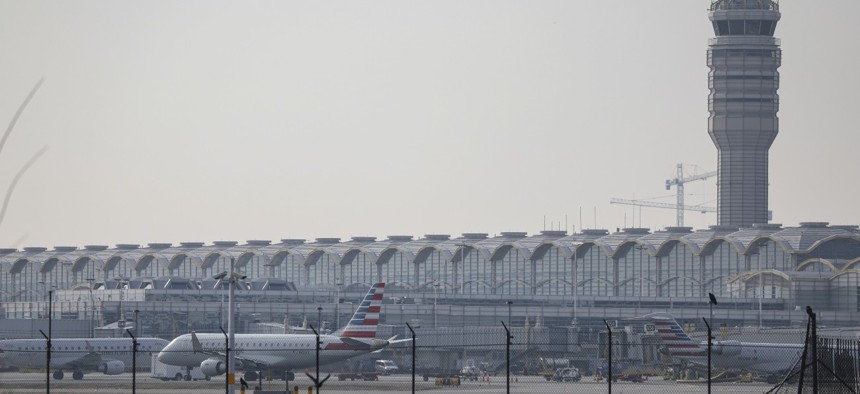
A plane takes off in Washington, D.C., on Jan. 11 after flights throughout the U.S. were cancelled and delayed following an FAA outage that grounded planes. Celal Gunes/Anadolu Agency via Getty Images
FAA is Facing a Looming Staffing Crisis as Post-Pandemic Needs Grow
Lawmakers suggest expanding the workforce pool to fill shortages, noting the aviation industry is overwhelmingly staffed by white men.
With the air traffic ramping up beyond the levels experienced before the COVID-19 pandemic, lawmakers and stakeholders on Thursday warned the Federal Aviation Administration and the industry it supports lacks the resources necessary to accommodate continued growth.
The number of aircraft flying in U.S. airspace is expected to double within the next 20 years, experts told the Senate Commerce, Science and Transportation Committee. The industry experienced significant turnover during the pandemic, witnesses and lawmakers said, leaving a workforce shortage as the Americans resume flying at normal rates and will increasingly due so in the years ahead.
“With post-pandemic aviation growth, we face new challenges and we need to develop a pipeline of qualified workers who either retired or voluntarily left the workforce in the COVID-19 pandemic,” said committee Chair Sen. Maria Cantwell, D-Wash. She added this required a new cadre of employees across the industry, and “not just pilots.”
“The FAA workforce must keep pace too," Cantwell said. "We must continue to invest in its 45,000 employees.”
David Spero, president of Professional Aviation Safety Specialists, a union that represents 11,000 FAA technical employees and inspectors, derided the agency for failing to commit to improving its staffing models and working with his organization to better plan for the future.
“PASS sincerely seeks to assist the agency in maintaining and enhancing its aviation safety workforce,” Spero said. “If only the agency was equally committed.”
Spero said he was “extremely concerned” about FAA's failure to maintain adequate staffing for its inspector workforce, which provides certification, education and oversight over the aviation industry. A 2021 Transportation Department inspector general report found 59% of managers in the Certificates Management Office and 79% in the Flight Standards District Office were short staffed. Pass has long faulted FAA for using a flawed staffing model and called on the agency to develop a long-term plan to better assess its needs for the rest of the decade and beyond.
Several senators bemoaned the lack of diversity in the aviation industry, noting 94% of pilots in the U.S. are male and 93% are white. They highlighted FAA programs they have helped launch in recent years to promote aviation to underrepresented groups, including grant programs that look to generate interest in the work at an early age. Just 24% of FAA employees and 16% of air traffic controller positions are women, according to Office of Personnel Management data.
Members of FAA's Women in Aviation Advisory Board encouraged lawmakers to expand outreach and education to more groups, help subsidize the typically high training costs and support programs that discuss aviation as a career path starting in grade school.
Sen. Raphael Warnock, D-Ga., said the current workforce shortage has created a "once in a generation opportunity" to cast a wider net when looking for FAA and broader aviation talent.
“We need to broaden the pool,” Warnock said. “We need all of our people to get to where we need to go.”
FAA has also experienced shortages in its air traffic controller workforce. In 2011, including trainees, FAA had more than 15,000 controllers on board. That has dipped for the last 11 years and as of 2022 had dropped by 10%. Workforce advocates have said the system should have instead grown by the same amount to keep pace with a busier airspace. Last summer, FAA caused widespread delays when it forced planes in the New York area to stay grounded due to staffing shortages.
The Biden administration has responded by increasing the FAA workforce. The fiscal 2023 omnibus funded the hiring of 1,500 new air traffic controllers and the president is seeking appropriations to hire another 1,800 next year.
“The hiring and training surge will streamline the path for controller training while further increasing resiliency to serve high demand markets as air traffic increases to pre-pandemic levels,” FAA said.
Cantwell joined several lawmakers and witnesses who said FAA needs permanent leadership as it tackles its current challenges. President Biden's nominee, Phil Washington, is currently awaiting confirmation before the Senate after some lawmakers challenged his knowledge of the system. Cantwell said she appreciated that he brought an outsider’s perspective and would not “go along with the groupthink of, Everything is OK.’”







